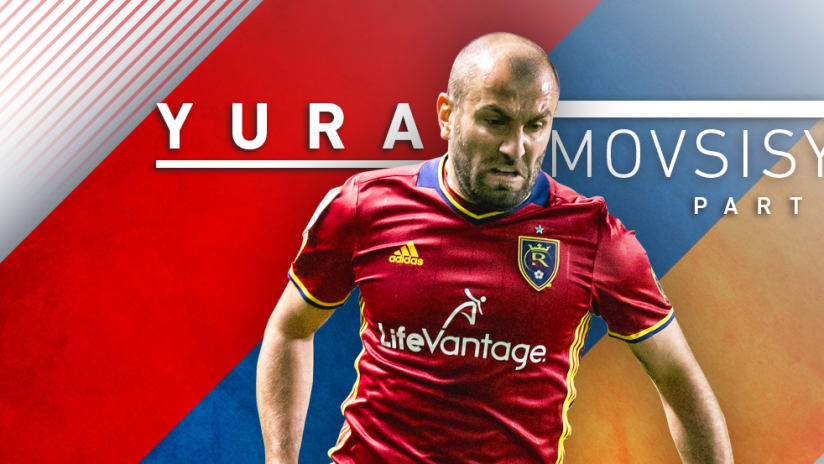This is Part 2 of a two-part series chronicling Real Salt Lake striker Yura Movsisyan's journey from Azerbaijan to Major League Soccer in the face of violence, political instability and long odds. You can read Part 1 here and watch Movsisyan lead RSL against D.C. United on Friday (10:30 pm ET; UniMas in USA and MLS LIVE in Canada).
THE FLIGHT FROM LOS ANGELES INTERNATIONAL AIRPORT TO DENMARK took the better part of a day, nearly 6,000 miles with multiple stops, but it takes far more than distance to keep grandmothers away from their grandchildren.
After establishing lives in the United States, first in Pasadena then in Kansas City and Salt Lake City, life in Denmark didn’t always come easy for Yura and Marianna Movsisyan. But in the midst of raising their baby son, and with their mothers making frequent visits, it didn’t feel lonely.
It certainly didn’t hurt that Movsisyan’s arrival in Randers in early 2010 — where he scored seven goals in his first 13 games — helped the struggling Danish club narrowly avoid relegation. Or that Robert Arzumanyan, a fixture on the Armenian national team, had joined the club the year before.
Movsisyan had once told ESPN that it was his “dream” to play for the US national team to “show my appreciation” for the country that had taken in his family after a decade without a home.
But in contrast to Armenian laws that offer a simplified citizenship process for “stateless persons” of Armenian descent, the US process offering permanence for asylum seekers is far slower moving. Even if the US, then coached by Bob Bradley, had wanted him, the country wasn’t quite ready to take him.
Arzumanyan suggested another path to international play. And although Movsisyan had never set foot in Armenia proper, he began to feel increasingly drawn to helping put his motherland on the soccer map. By the time he began negotiations with Russia’s FC Krasnodar in late 2010, he’d cemented his international commitment.
“The turning point in the decision was that, basically, I had a heart-to-heart with myself,” Movsisyan says. “I asked, ‘What would make me more proud?’”
He acknowledges that he might have had a better chance of playing in a World Cup had he waited for US citizenship; that’s a dream that will likely go unfulfilled. But he doesn’t regret the decision, which saw him pull on the Armenian jersey against teams such as Italy, Germany and Portugal — and put him in position to be seen by bigger and better-paying European clubs.
By far the best result, though, was hearing the roar of the Armenian crowd when he put the ball in the net. Of Movsisyan’s 10 goals in international play, seven have been game-winners.
“To play for Armenia — to see what it means to the people there — there’s no better feeling than that,” Movsisyan says. “We’ve been through wars and genocide. To be able to be part of history, to make people happy, that was a big reward.”
But there is a difference between having a homeland and having a home. Although he and his family have made frequent trips to the Armenian capital of Yerevan in recent years, Movsisyan has yet to see much more than the airport, his hotel, the team’s training center, and the stadium.
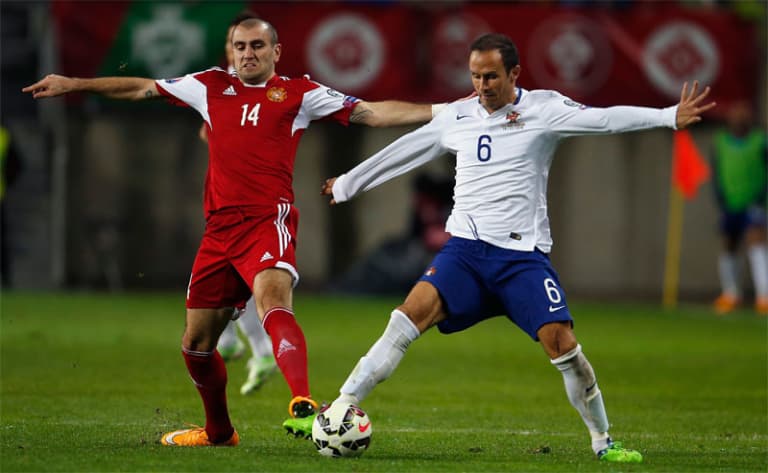
Yura Movsisyan was born in Baku, Azerbaijan, to Armenian parents. The Movsisyans eventually settled in Pasadena, California. Yura has represented Armenia in international play 35 times, scoring 10 goals, including the opener against Italy in a 2-2 draw during 2014 World Cup qualification. Photo via Reuters
“A different attitude”
On the pitch, everything was clicking. Movsisyan netted 23 goals in just over a year with Krasnodar. Then, after a highly publicized, multi-million dollar transfer to Spartak Moscow in 2012, he added 25 more.
The move to Spartak, one of Russia’s wealthiest clubs, made Movsisyan one of the highest-paid players in the country. An extension in early 2015 bumped his salary to a reported $2.8 million a year.
Off the field, however, Moscow could not offer the sort of home the Movsisyans were increasingly longing for.
When their son became old enough to start dribbling a ball, and as they welcomed a new daughter into their family, the desire to be in a place where they felt more welcome grew.
“There was just a different attitude there,” Marianna says of Moscow’s infamous brusqueness, often directed at those who do not speak Russian. “It was a tense environment, and I started to crave coming back.”
In Salt Lake, Movsisyan felt like part of a “soccer family.” In Moscow, he says, he felt like property.
“The more success I had,” he told Utah’s Deseret News in January, “the worse the treatment got.”
As he battled several injuries that kept him off the field for much of 2015 — and as he endured a public rift involving another player who accused Spartak’s Turkish coach of discriminating against Armenian players — Movsisyan told his agent that he longed to come back to the United States.
Not just anywhere. And not even to Los Angeles, where their families were settled.
“Salt Lake was the only place I wanted to go,” he says. “Because that’s what felt like home.”
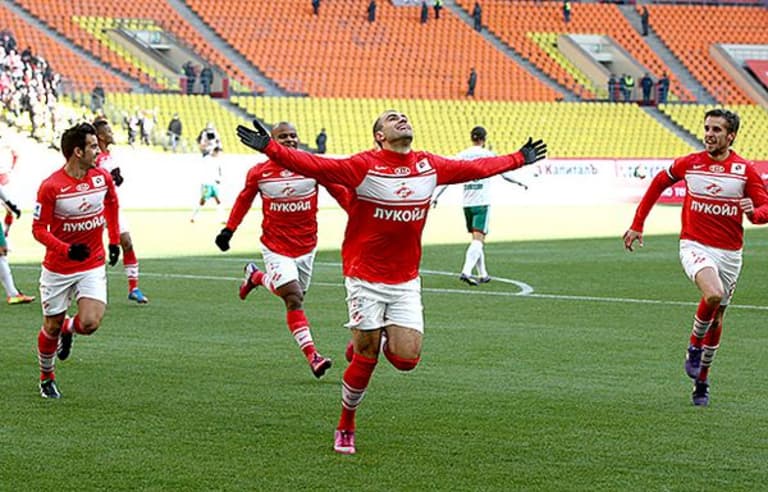
Movsisyan scored a hat trick in his Spartak Moscow debut, the first player to do so for the storied Russian club. He spent three years in the capital, scoring 25 goals, until the desire to return to Real Salt Lake became too strong to resist. RSL agreed to a one-year loan with Spartak ahead of the 2016 season. Photo via Spartak Moscow
“Yura wants to come back”
Movsisyan had always been on Real Salt Lake general manager Craig Waibel’s radar. Because the club still held the player’s MLS rights, he’d been watching Movsisyan closely — and waiting for an indication that the striker was ready to return.
“We’d be tracking him,” Waibel says. “Every game. Every minute he played.”
The first call from Movsisyan’s agent, Patrick McCabe, didn’t result in a deal, but Waibel says the words McCabe used were telling.
“It wasn’t, ‘Yura wants to come back to Major League Soccer,’” Waibel recalls. “It was, ‘Yura wants to come back to Real Salt Lake.’ I always knew that we would want Yura to come back here. But the fact that Yura really wanted to come back made a huge difference.”
There was no question of need. RSL had scored the second fewest goals in the league in 2015, the first year the club failed to make the playoffs since 2008. But as much as Waibel wanted to bring Movsisyan back, money was going to be a challenge.
“The resource stream Spartak has versus what we have? It’s exponential,” Waibel says.
“The choice Yura made to come here,” Waibel adds, “will never be equaled monetarily.”
There’s no doubt that Movsisyan left a lot of cash on the table when he accepted Waibel’s offer to bring him back to MLS on a one-year loan from Spartak.
That choice, Movsisyan acknowledges, came at a cost of “millions.” But he says he has no regrets. Now he just has to close the deal.
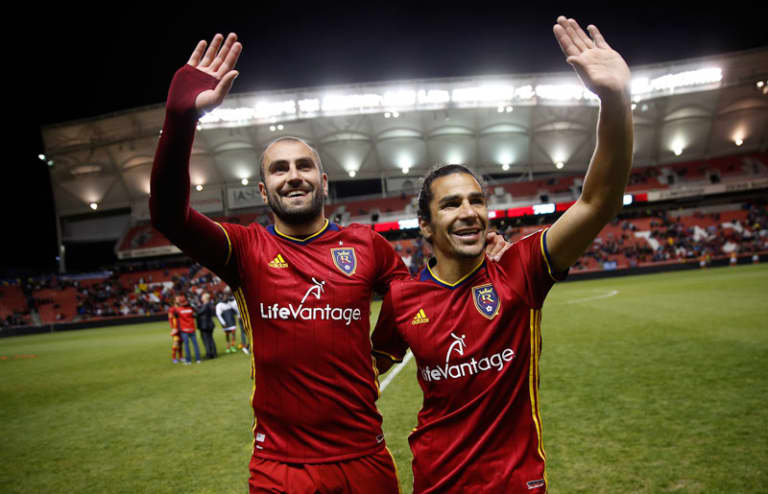
Movsisyan celebrates a win with teammate Tony Beltran. The pair grew up together in Southern California, and were teammates at youth powerhouse Arsenal FC. Movsisyan, who had recently immigrated to the United State, was welcomed into the Beltran household with open arms. “I could never repay what they did for me,” he says. Photo via USA Today Sports Images
“The goals will come”
Movsisyan’s mother, Aida, is preparing dinner in the kitchen. Armenian music is streaming in from the television in the family room.
It’s early in the afternoon on a warm spring day in mid-May, and Movsisyan, just back from practice, is nursing a bottle of water at the dining room table of the home he is renting for his family, about 15 minutes southeast of Rio Tinto Stadium.
The season is barely a quarter through, but Movsisyan is already thinking about how it will end. When it does, he notes, Real Salt Lake will make a decision on whether to buy out the rest of his contract from Spartak.
He’d like to make Waibel’s job easy in that regard. The more goals he scores, Movsisyan says, the harder it will be for his new team to decline the purchase option.
The confidence that got him this far has not faltered. He is still the boy who always knew he’d be a professional footballer. “The goals will come,” he says. “I’m not worried.”
He has, after all, created plenty of opportunities. He has no assists, but Cassar believes that the space Movsisyan creates for fellow forwards Joao Plata and Juan Manuel “Burrito” Martinez has been crucial to those players’ production. Movsisyan reminds himself that he’s struck woodwork again and again. He’s inches away from having three or four more goals already this season.
“Yeah,” he says, crackling the now-empty bottle in his fist. “The goals are coming.”
But so is his 29th birthday, and while he doesn’t feel old, Movsisyan understands that MLS general managers are always looking for young and ascendant forwards — not only those who score goals but those who score goals that change games. If he does not score like that, he knows, there is no guarantee he’ll be staying in Salt Lake.
Everything he has been through, he says, has brought him to this moment — to this opportunity. And he knows it’s not enough to simply believe the goals are coming.
“I want this,” he says as he takes his third child, a daughter who was born in April, into his arms, “and I’m going to work extra hard for it.”
The next week in Kansas City, a volley careens off Brad Davis’ shoulder for an own goal that puts Real Salt Lake up 2-0 in the first half (WATCH). In the stadium where Salt Lake lost MLS Cup 2013 while Movsisyan was racking up goals for Spartak, Sporting cuts the lead at the start of the second half. Three minutes later, Movsisyan answers, dribbling 40 yards at speed before casually chipping the ball over goalkeeper Tim Melia (WATCH).
Down a goal on June 2 against New York City FC at Yankee Stadium, Movsisyan finds himself alone and tangled up with defender Jason Hernandez at the top of the penalty box. The next two seconds are no thing of beauty, rather brute force, as Movsisyan muscles his way goal side, leaving Hernandez on the ground as the ball finds the bottom corner of the net (WATCH).
Down again against Portland in Salt Lake’s next match, Movsisyan dribbles into the box, cutting back to leave defender Jermaine Taylor off balance and stretched to draw the foul. There’s no debate as to who will take the kick; Movsisyan immediately picks up the ball and takes it to the spot. Timbers keeper Jake Gleeson guesses correctly, but it does not matter (WATCH).
Down yet again against the New York Red Bulls just days later and flanked by both Aurelien Collin and Chris Duvall, Movsisyan somehow gets behind both of his marks to meet a floating cross from John Stertzer. The equalizing header seems almost effortless (WATCH).
At the end of June, he’s named the Etihad Airways Player of the Month. He has six goals in 15 games, and seems to be hitting his stride as spring turns to summer.
Yes, he can still score like Yura Movsisyan. With the speed and finesse that made him so valuable in Russia. With the sort of brutish intensity Waibel first witnessed nearly a decade ago. With confidence and ascendance.
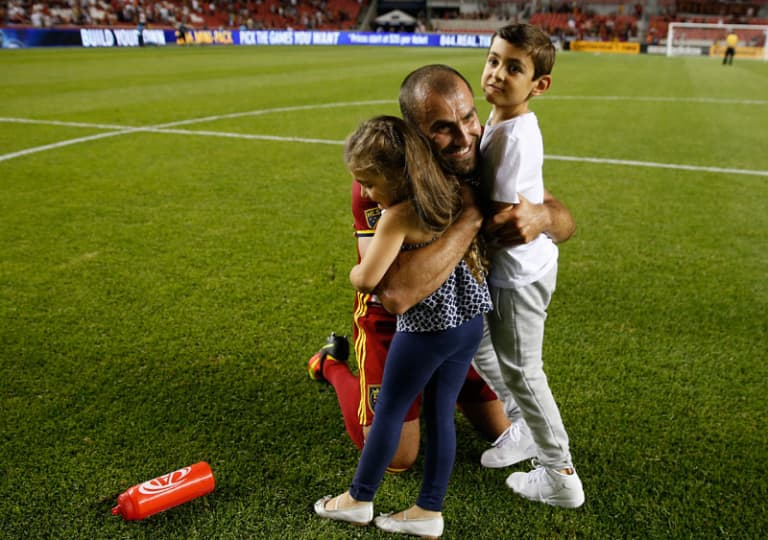
Now a family man with three children, Movsisyan says he'd like to settle down as they get closer to school age. Unlike his childhood, marked by war and poverty, his son and two daughters won't grow up with anything hanging over their heads. “They don’t have to have hardships,” Movsisyan's mother Aida says. “They don’t have to have dark times.” Photo via USA Today Sports Images
“You're never sure where you're going next”
There’s always a light on in Movsisyan’s bedroom. He’s never been quite sure why he doesn’t like to sleep in the dark.
But his mother knows.
“Every time we had to move,” Aida says, “we moved in the dark.”
These days, Aida’s greatest joy in life is knowing her grandchildren are safe.
“They don’t have to have hardships,” she says. “They don’t have to have dark times.”
Movsisyan has never worried about protecting his children from the sort of violence he witnessed as a child. That is a gift he was given by his parents, who fought desperately to ensure their two sons could raise their own children in a safe place.
But with his son now in school, and two daughters who will be getting there soon, Movsisyan would like to spare his kids the impermanence he experienced as a boy.
“The first thing I did, as soon as I could,” he says, “was to buy my parents their first house.” Movsisyan never bothered to do the same for himself, though, “because you’re never sure where you’re going next.”
But he’d like to be sure.
As Real Salt Lake approach a seven-game July, Movsisyan knows he is playing for more than an eventual playoff spot. More even than a chance to lift MLS Cup once again. But if those things happen, he notes, everything else should fall into place.
Movsisyan steps out onto the front porch, which overlooks the Salt Lake Valley, and leans against the railing.
Someday, he has told himself, he will have a home like this.
Missed Part 1 of Yura Movsisyan's story? Learn about his refugee journey from Baku, Azerbaijan, to Southern California here.
Matthew D. LaPlante is an assistant professor of journalism at Utah State University and a lifelong soccer player, coach, referee and fan. He was in Spartan Stadium on April 6, 1996, when San Jose defeated D.C. in the first match in Major League Soccer history.
THE WORD is MLSsoccer.com's regular long-form series focusing on the biggest topics and most intriguing personalities in North American soccer.

